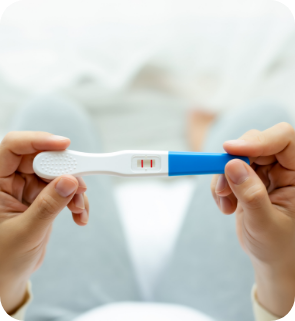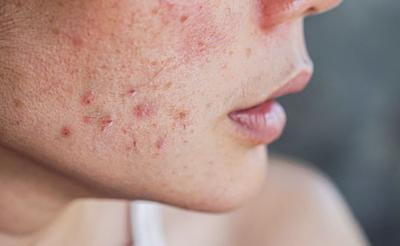
Understanding The Cause and Treatment For PCOS Hair Loss
Polycystic ovary syndrome (PCOS) is a group of symptoms related to anovulation (lack of ovulation) and excess androgens, or male hormones, such as testosterone. The consequence of androgen overproduction is an array of symptoms that often make life very difficult for those affected, especially in terms of mental health.
Notable symptoms include infertility (anovulation), irregular periods, weight gain, hirsutism and hair loss. PCOS hair loss, also known as PCOS hair thinning, female pattern baldness or androgenic alopecia, is one of the most distressing symptoms to experience.
Its presentation is commonly experienced as the loss of hair fullness on the front/central region of the scalp, often moving through to the mid-scalp region in a Christmas tree-like fashion.
Related: PCOS Symptoms & Causes

Why Does PCOS Cause Hair Loss?
The primary cause of PCOS hair loss is the excess production of androgens (such as testosterone), which is part of the diagnostic criteria for PCOS. Specifically, PCOS can drive hair loss by one or more of the following hormonal imbalances:
- Higher than normal androgen levels (most commonly testosterone
- Higher than normal 5-alpha reductase (5-aR) levels
- Higher than normal DHT levels
- Decreased levels of cytochrome p 450 enzyme
These hormonal disruptions are not merely caused by PCOS. Instead, there will be an underlying condition that is driving excess testosterone in the form of the imbalances listed above.
What are the possible underlying conditions? Well, there’s a few - the most common being Insulin Resistance (IR) which is found in 70% of women with PCOS. IR causes elevated insulin levels which, consequently, causes your ovaries to over-produce testosterone.
Due to its prevalence (7 in 10 women), it’s easy to assume IR, without further investigation, is the condition that’s driving your own PCOS. Despite the likelihood, this isn’t always the case. It’s best to work with a doctor who you trust to rule out other underlying conditions or drivers. They are:
Inflammation: Long-term, chronic inflammation causing your body to be on high alert - 24/7. Common presenting symptoms are fatigue and unexplained tiredness; digestive issues and food sensitivities; recurring infections, skin issues, headaches and joint pain.
Adrenal (Stress): The main trigger for this is thought to be stress-related: either emotional, metabolic, or physical. Many of the presenting symptoms will be identical to that of IR.
The difference, then, is that women with stress as their underlying PCOS driver will not have elevated free and total testosterone (a hormone imbalance indicative of IR). Rather, they’ll have an elevated level of DHEA which is another androgenic hormone predominantly produced by the adrenal gland.
Post-Pill (Pill-Induced): Despite being only partially recognised by conventional medical experts, coming off birth control does appear to cause a temporary PCOS-like state in some women.
Specifically, it can cause an androgenic hormone surge that begets testosterone-related symptoms like PCOS hair loss. Collectively, with IR, these drivers make up the four types of PCOS which can be identified through the correct blood tests, carried out by a qualified medical professional.
Related: 4 Types Of PCOS
Other possible drivers of PCOS hair loss can be:
- Low thyroid (1 in 5 women)
- Vitamin D deficiency (2 in 3 women)
- Zinc deficiency (very common in women)
- Stress or excess cortisol production (an extremely common problem for women with PCOS)
Can You Reverse PCOS Hair Loss?
Although reversing PCOS-related hair loss can take time, it is possible.
Your efforts need to be focused on addressing the cause or driver, which means identifying the underlying condition that is contributing to and exacerbating your PCOS, for example, IR.
Then, it’s about improving it through the correct lifestyle choices. If you do this, you’ll be giving yourself the best chance at reversing PCOS hair loss.
PCOS Hair Loss Treatment
While the most effective way to reverse PCOS-related hair loss is by addressing your underlying condition, there are treatment options for managing it; each of which focuses on reducing the androgenic hormones your body produces.
Medical Treatment
Spironolactone:
Spironolactone, sold under the brand name Aldactone, is a diuretic or ‘water pill’ used to treat high blood pressure and heart failure. A common theme in our VIP Facebook Group is women asking whether or not spironolactone will help with hair loss. In short, it can.
This is because it helps to lower androgen levels by blocking androgen receptors. And in doing so, helps to reduce other androgen-related symptoms too, like hair growth and acne.
However, spironolactone used alone can cause irregular bleeding and could cause problems if used during pregnancy. For these reasons, it is best not to take spironolactone during pregnancy or if your goal is to fall pregnant.
Minoxidil (Rogaine):
Minoxidil is a serum developed initially as an oral medication for blood pressure that promotes hair growth, thickness and strength. Despite taking up to 4 months for results, it is believed to work by partly enlarging hair follicles and prolonging the growth phase of hair.
With more follicles in the growth phase, you’ll see more hair coverage on your scalp. This is what I would consider a “band-aid solution”. For this treatment to become a long-term viable option, you’ll need to use it indefinitely.
Supplements For PCOS Hair Loss
Zinc
Zinc is a trace mineral that many women with PCOS are deficient in. It's also an essential micronutrient needed for survival that can positively affect several PCOS related symptoms such as ovulation, acne, androgen excess, insulin sensitivity and the regulation of blood glucose levels.
As we know, hair loss or thinning is a symptom of high androgen levels in women with PCOS. A percentage of your testosterone is converted into a much more potent androgen called dihydrotestosterone (DHT).
It is DHT that blocks the hair follicle cycle leading to hair thinning and loss, especially on the scalp. Zinc helps to block this conversion, thus helping to reduce PCOS-related hair loss. Substantiating this is a 2016 study which found that 50mg of zinc daily for 8 weeks resulted in a significant reduction in hair loss among PCOS women.
Saw Palmetto
Saw palmetto is a palm tree native to the southeast regions of North America and especially abundant in Florida, Georgia, Cuba, and the Bahamas. It’s thought to work, like zinc, by blocking the enzyme that converts testosterone to dihydrotestosterone (DHT), which we’ve established as one of the most potent androgens and a major masculine-presenting hormone of PCOS.
Saw palmetto appears to be most effective when taken in daily doses of 160–320 mg; however, it should not be taken if you're currently pregnant or breastfeeding.
Always consult your healthcare provider before taking saw palmetto to ensure your safety and appropriate dosage.
PCOS Hair Loss Regrowth Success
Keneisha L

Emma C.

Summary: Treatment For PCOS Hair Loss
- Medical Treatment
- Spironolactone
- Minoxidil (Rogaine)
- Supplements For PCOS Hair Loss
- Zinc
- Saw Palmetto

















